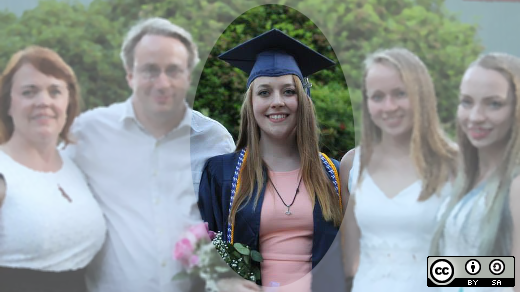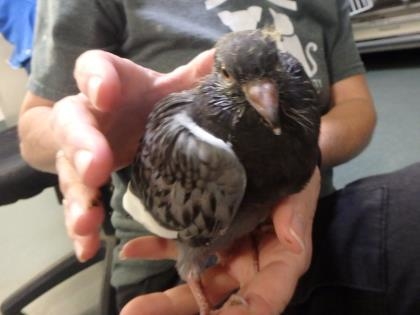Mr. Torvalds’ sudden cucking out to the forces of Social Justice is a shock after so many years of successfully holding the line. Can physiognomy help explain why? I’ve never yet looked at Torvald’s appearance… figured he was a typical pasty-skinned computer geek with thick glasses, rounded shoulders, a server rack-sized forehead and a bad haircut. Who wants to see that?

Hmm. Pasty skin, glasses, shoulders, check. Forehead, not really, and haircut is generic.
He has jowls and a strong jaw, indicating an aggressive/determined personality. Also, see those vertical lines between his eyebrows? That’s another good indicator. His ears are tight to his skull, typical for confromist (rules-favoring) people, but lower than his eyes, which is an indicator against intelligence and introversion.
Neither does his forehead appear intelligent–it is proportional to the rest of his face and has no horizontal lines on it, a routine feature of men who think for a living. That doesn’t guarantee he’s low-IQ but between common intelligence and a forceful personality, I suspect his achievements came through hard work and high standards rather than true creativity. Ain’t no shame in that.
His choice of eyeglasses–no hard edges–suggests self-awareness of how unpleasant he can be towards others.
His nose is not at all what I was expecting. It’s very wide and the tip is turned up, indicators of sociability. The nostrils are huge, suggesting a high energy level. That’s the nose of a family man, not a cloistered academic.
Perhaps Torvald’s genius is more in convincing nerds to cooperate with him on large-scale projects rather than being a visionary innovator. That would explain “family-oriented guy with no tolerance of rule-breaking”. So far, so good, but this is not a man I would expect to suddenly break with a lifelong habit of giving a damn about tender feelings over rigorous codework.
Let’s look at his family.

Holy estrogen, Batman! Torvalds is a DODO! Dad Of Daughters Only. This pic was sourced from a VERY interesting article biographing the highlighted daughter.
Torvalds 2.0: Patricia Torvalds on computing, college, feminism, and increasing diversity in tech
https://opensource.com/life/15/8/patricia-torvalds-interview
By Rikki Endsley, 3 August 2015
At 18, Patricia is a feminist with a growing list of tech achievements, open source industry experience, and her sights set on diving into her freshman year of college at Duke University’s Pratt School of Engineering. She works for Puppet Labs in Portland, Oregon, as an intern, but soon she’ll head to Durham, North Carolina, to start the fall semester of college.
Incoming frosh in 2015 means she’s now a college senior in the Poison Ivy League at Duke U. More than time for the feminazis to corrupt a girl whose father wasn’t redpill.
In this exclusive interview, Patricia explains what got her interested in computer science and engineering (spoiler alert: it wasn’t her father), what her high school did “right” with teaching tech, the important role feminism plays in her life, and her thoughts on the lack of diversity in technology.
What made you interested in studying computer science and engineering?
My interest in tech really grew throughout high school. I wanted to go into biology for a while, until around my sophomore year. I had a web design internship at the Portland VA after my sophomore year. And I took an engineering class called Exploratory Ventures, which sent an ROV into the Pacific ocean late in my sophomore year, but the turning point was probably when I was named a regional winner and national runner up for the NCWIT Aspirations in Computing award halfway through my junior year.
The award made me feel validated in my interest, of course, but I think the most important part of it was getting to join a Facebook group for all the award winners. The girls who have won the award are absolutely incredible and so supportive of each other. I was definitely interested in computer science before I won the award, because of my work in XV and at the VA, but having these girls to talk to solidified my interest and has kept it really strong. Teaching XV.more on that later.my junior and senior year, also, made engineering and computer science really fun for me.
She was first interested in biology, the science of choice for raising babies & tending to hurting people, until she got her first hit of I’m Special Because I’m Female in Male Space.
What do you plan to study? And do you already know what you want to do after college?
I hope to major in either Mechanical or Electrical and Computer Engineering as well as Computer Science, and minor in Women’s Studies. After college, I hope to work for a company that supports or creates technology for social good, or start my own company.
Reading this is like watching a train wreck in slow motion. She never cared about the tech, only in being the center of attention (“start my own company”) or care-based morality (“supports or creates technology for social good”). The door is open for Social Justice mindfucking.
My daughter had one high school programming class.Visual Basic. She was the only girl in her class, and she ended up getting harassed and having a miserable experience. What was your experience like?
My high school began offering computer science classes my senior year, and I took Visual Basic as well! The class wasn’t bad, but I was definitely one of three or four girls in the class of 20 or so students. Other computing classes seemed to have similar gender breakdowns. However, my high school was extremely small and the teacher was supportive of inclusivity in tech, so there was no harassment that I noticed. Hopefully the classes become more diverse in future years.
Entryist teacher more interested in results for social good than encouraging women to act feminine.
What did your schools do right technology-wise? And how could they have been better?
My high school gave us consistent access to computers, and teachers occasionally assigned technology-based assignments in unrelated classes.we had to create a website for a social studies class a few times.which I think is great because it exposes everyone to tech. The robotics club was also pretty active and well-funded, but fairly small; I was not a member. One very strong component of the school’s technology/engineering program is actually a student-taught engineering class called Exploratory Ventures, which is a hands-on class that tackles a new engineering or computer science problem every year. I taught it for two years with a classmate of mine, and have had students come up to me and tell me they’re interested in pursuing engineering or computer science as a result of the class.
Such social programs intended to interest (female) students in STEM are as much a part of Feminism 2.5 as the Satanic sex cults. They exist to pervert girls away from their natural biology at an early age, comparable to homosexuals raping boys as a form of recruitment for Leftoid causes.
Student teachers is also a bad idea. Encouraging students to help each other with coursework, fine; assuming that a 16yo can teach a class as well as an adult, not fine. One can see this even at the university level with staff & faculty soliciting student input on how the university should do its business. That’s not unlike a businessman asking a customer what price he should set. Great way to go out of business.
However, my high school was not particularly focused on deliberately including young women in these programs, and it isn’t very racially diverse. The computing-based classes and clubs were, by a vast majority, filled with white male students. This could definitely be improved on.
Brainless bitch. She hates her own people. With all the institutional hatred directed at white men, it’s not hard to understand why a feral white female would prefer a vibrant “winner”.
It’s a safe bet Patricia is already burning coal. *checks* Whoops. Asian cock. She’s minoring in East Asian studies. Bangkok, Thailand!
Growing up, how did you use technology at home?
Honestly, when I was younger I used my computer time (my dad created a tracker, which logged us off after an hour of Internet use) to play Neopets or similar games. I guess I could have tried to mess with the tracker or played on the computer without Internet use, but I just didn’t. I sometimes did little science projects with my dad, and I remember once printing “Hello world” in the terminal with him a thousand times, but mostly I just played online games with my sisters and didn’t get my start in computing until high school.
Well done, Mr. Torvalds. He obviously took an interest in his children not getting addicted to the Internet. Many, many parents fail here, nerd parents conspicuously so. Sounds like Daddy had her under control until her high school SJW teachers got their hooks into her hamster.
Homeschool or die.
You were active in the Feminism Club at your high school. What did you learn from that experience? What feminist issues are most important to you now?
My friend and I co-founded Feminism Club at our high school late in our sophomore year. We did receive lots of resistance to the club at first, and while that never entirely went away, by the time we graduated feminist ideals were absolutely a part of the school’s culture. The feminist work we did at my high school was generally on a more immediate scale and focused on issues like the dress code.
She was young, hot and tight, and feminism gave her the freedom (from dress codes) to flaunt it while she had it. While Mr. Torvalds was a responsible father, he must have been dangerously ignorant about female sexuality. A common problem for both his generation and DODOs in general.
Personally, I’m very focused on intersectional feminism, which is feminism as it applies to other aspects of oppression like racism and classism. The Facebook page Guerrilla Feminism is a great example of an intersectional feminism and has done so much to educate me. I currently run the Portland branch.
Portland, Oregon. Possibly the largest enclave of SJWs in America outside of NYC and Sodom Francisco. Torvalds’ daughter operated it since her high school days. The picture begins to clear, what could have forced Torvalds to drop his guard against SJW entryism. Patricia betrayed her father in the name of Social Justice, just like Soviet children used to turn in their parents to the Commissariat.
Feminism is also important to me in terms of diversity in tech, although as an upper-class white woman with strong connections in the tech world, the problems here affect me much less than they do other people. The same goes for my involvement in intersectional feminism. Publications like Model View Culture are very inspiring to me, and I admire Shanley Kane so much for what she does.
Shanley Kane is founder and CEO of Model View Culture, a publication dedicated to forcing Social Justice into tech spaces, apparently defunct since 2016. It’s possible she used Patricia’s admiration of her as a weapon against Torvalds. Here’s a quick quote from a recent article of hers demonstrating her mental sickness:
.Here.s To The Crazy Ones.: Stigma Against Mental Illness in Tech
By Shanley Kane, 31 August 2015
You.ll notice from my notes that I, like many other marginalized people suffering from mental illness, don’t or cannot separate the mental illness from the effects of past and ongoing trauma and stigma. I cannot parse it out from anything else any more, if I ever could at all. The anxiety stems from the trauma and makes the trauma worse, and fear of the trauma at times is more unbearable than trauma itself. The way I am stigmatized and the ableist and misogynist abuse I receive dramatically lowers my chances of a good long-term mental health outcome. My life as a hypervisible woman in tech reverberates with violence, the strumming chord through my past and future, the string in the theory. It is impossible to know where one stops and the other begins, rather they ebb and flow together in ways that deeply impact my overall and long-term levels of happiness and fulfilment, and have a direct and specific impact on my work both today as a founder and in my previous work in the field.

This picture is part of her article. That’s not a picture of mental illness, that’s a picture of witchcraft. Don’t think I’m being sensational when I talk about stuff like Satanic sex cults. Such atrocities have become a typical part of the young adult experiences of women such as Patricia Torvalds.
Back to the interview:
What advice would you give parents who want to teach their children how to program?
Honestly, nobody ever pushed me into computer science or engineering. Like I said, for a long time I wanted to be a geneticist. I got a summer internship doing web design for the VA the summer after my sophomore year and totally changed my mind. So I don’t know if I can fully answer that question.
I do think genuine interest is important, though. If my dad had sat me down in front of the computer and told me to configure a webserver when I was 12, I don’t think I’d be interested in computer science. Instead, my parents gave me a lot of free reign to do what I wanted, which was mostly coding terrible little HTML sites for my Neopets. Neither of my younger sisters are interested in engineering or computer science, and my parents don’t care. I’m really lucky my parents have given me and my sisters the encouragement and resources to explore our interests.
Props again to Mr. Torvalds for not pressuring his kids to follow his footsteps. That’s another difficult step for parents.
Still, I grew up saying my future career would be “like my dad’s”.even when I didn’t know what he did. He has a pretty cool job. Also, one time when I was in middle school, I told him that and he got a little choked up and said I wouldn’t think that in high school. So I guess that motivated me a bit.
Patricia admired her father… how cute and appropriate… before she dove deep into intersectional feminism and ended up saying this:
What suggestions do you have for leaders in open source communities to help them attract and maintain a more diverse mix of contributors?
I’m actually not active in particular open source communities. I feel much more comfortable discussing computing with other women; I’m a member of the NCWIT Aspirations in Computing network and it’s been one of the most important aspects of my continued interest in technology, as well as the Facebook group Ladies Storm Hackathons.
I think this applies well to attracting and maintaining a talented and diverse mix of contributors: Safe spaces are important. I have seen the misogynistic and racist comments made in some open source communities, and subsequent dismissals when people point out the issues. I think that in maintaining a professional community there have to be strong standards on what constitutes harassment or inappropriate conduct. Of course, people can.and will.have a variety of opinions on what they should be able to express in open source communities, or any community. However, if community leaders actually want to attract and maintain diverse talent, they need to create a safe space and hold community members to high standards.
The boldfaced sounds EXACTLY like Torvalds’ infamous management style.
I also think that some community leaders just don’t value diversity. It’s really easy to argue that tech is a meritocracy, and the reason there are so few marginalized people in tech is just that they aren’t interested, and that the problem comes from earlier on in the pipeline. They argue that if someone is good enough at their job, their gender or race or sexual orientation doesn’t matter. That’s the easy argument. But I was raised not to make excuses for mistakes. And I think the lack of diversity is a mistake, and that we should be taking responsibility for it and actively trying to make it better.
Three years later, a mysterious somebody forced Torvalds to drop his meritocratic standards and allow intersectional feminist entryism to replace the meritocracy he’d furiously defended from outsiders… exactly the entryism his daughter Patricia had been calling on tech industry leaders such as Torvalds to allow.
The knife in the back cuts deepest.





























